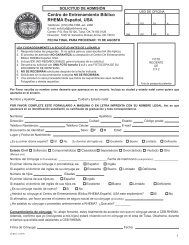Download - Rhema
Download - Rhema
Download - Rhema
- No tags were found...
You also want an ePaper? Increase the reach of your titles
YUMPU automatically turns print PDFs into web optimized ePapers that Google loves.
Training can contain these elements:• Continuous education and training,by department. Make sureyour workers learn and stay sharp onpeople skills, delegating techniques,rules and procedures in theirdepartment, and what it takes to dotheir job better.• Problem solving. First, provide away for workers to air their concernsand work together to solve problems.Second, train them to bring an ideafor a solution when they want toaddress a problem.What about awkwardsituations?When a team member leaves, whetherhappily or unhappily, there’s a delicatedistinction between secrecy andprivacy. Some matters are truly privateand best left that way, but when thingsaren’t explained, people are left to cometo their own conclusions. Sometimes it’sbetter to err on the side of candor. Hereare some thoughts:• Public explanation. If possible, workwith the person who is leaving towrite a joint statement, and read it tothe congregation. This can go a longway toward a healthy departure foreveryone concerned.• Allow closure. Churches sometimespay too little attention to good-byes.When closure is neglected, unhealthypatterns may develop that causeproblems with future relationships.Consider a farewell service or party—a time for letting go of the past,embracing the future, and restatingthe vision of the pastor and thechurch.• Read it. Any time you have to tell thecongregation about a difficult situationor transition, write down exactly whatyou want to say. Have someone elseread what you have written first, soyou can make sure it is clear. Then, readit verbatim from the pulpit, withoutdeviating. This technique will preventyou from stumbling around or sayingsomething regrettable off the cuff.How can we prevent staff infection?• Before hiring or appointing staff, get to know the candidate in different settingsand observe them in interactions with other staff members. See if they fit in yourenvironment. Don’t just believe a resume, interviews, or someone else’s word. Andnever ignore your gut instinct.• Use personality inventories* to capitalize on people’s strengths, and to forecastor handle potential areas of conflict.• Make sure everyone has a detailed job description, so that expectations areclearly outlined.• Have weekly face-to-face meetings or friendly chats. Find a way and a placewhere concerns can be aired and a common heartbeat can be established. Don’tlet resentment or frustration build due to lack of communication.• Consider getting together socially. Visit each other’s homes. Be a family.• Honor each other’s time. Avoid unnecessary meetings. Start meetings on time,and don’t waste time by being unprepared. Stay on task.• Assist your helpers in maintaining their spiritual life. Encourage them to be inservices, read their Bible, and keep their personal devotional life strong.• Express appreciation, and expect a lot. People tend to live up to what is expectedof them. Have faith in your helpers, and respect them. That way, everyone wins.The 10 worst things you can doto a staff member or volunteer:1. Never communicate to them (either about your expectations or howthey’re performing).2. Assign them a task, and then do it for them.3. Never acknowledge, reward, or appreciate their hard work or ideas.4. Never consider their suggestions.5. Don’t give them a job description (overall, or for specific jobs).6. Give them a responsibility but no authority to carry it out.7. Ignore the fact that they have outside interests and responsibilities.Never give them time off.8. Don’t train them or help them do their job more effectively. (Then,point out their shortcomings.)9. Make sure there’s no way they can reach the leadership or expresstheir concerns or questions.10. Resent them if people like them or if they excel.*Some possible personality inventories:Personality Plus. Defines temperaments as choleric, melancholy, sanguine, and phlegmatic.www.classervices.com/FlorenceLittauer.htmlMyers-Briggs (MBTI). Looks at four areas of behavior and motivation: introvert/extrovert, sensing/intuition,thinking/feeling, and judging/perceiving.www.myersbriggs.orgDISC. Examines personality through the traits of dominance, influencing of others, steadiness, andcautiousness/compliance. www.discprofile.comAnimals. Defines four basic personality types: the lion, otter, retriever, and beaver.www.new-life.net/persnty.htmMotivational Gifts. Identifies various gifts based on Romans 12.www.heart2heart.orgr h e m a . o r g | 1 9
















